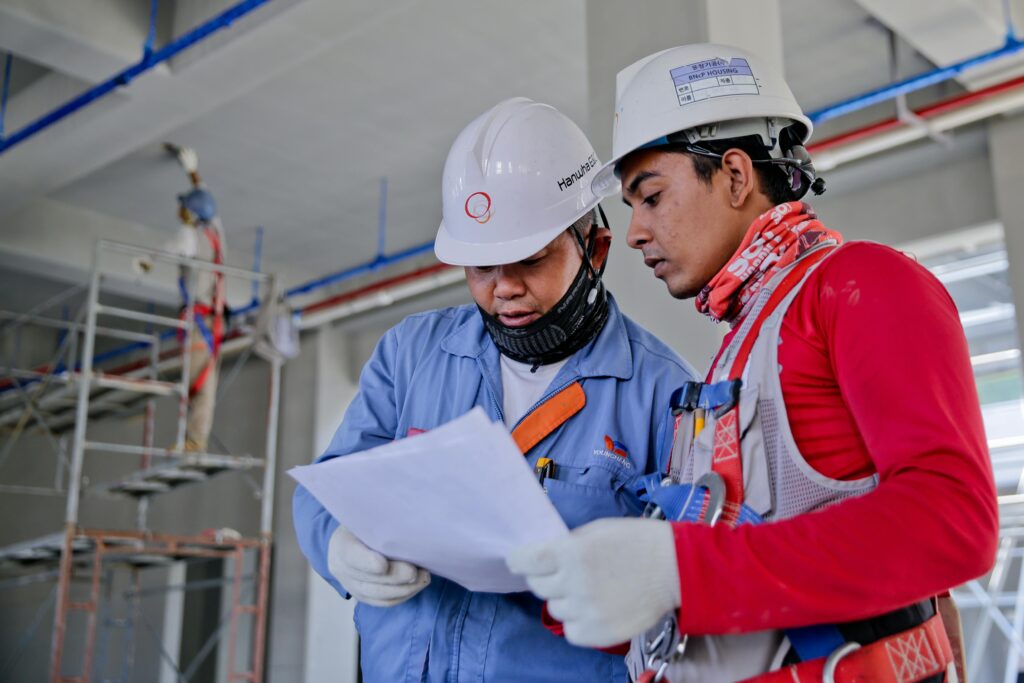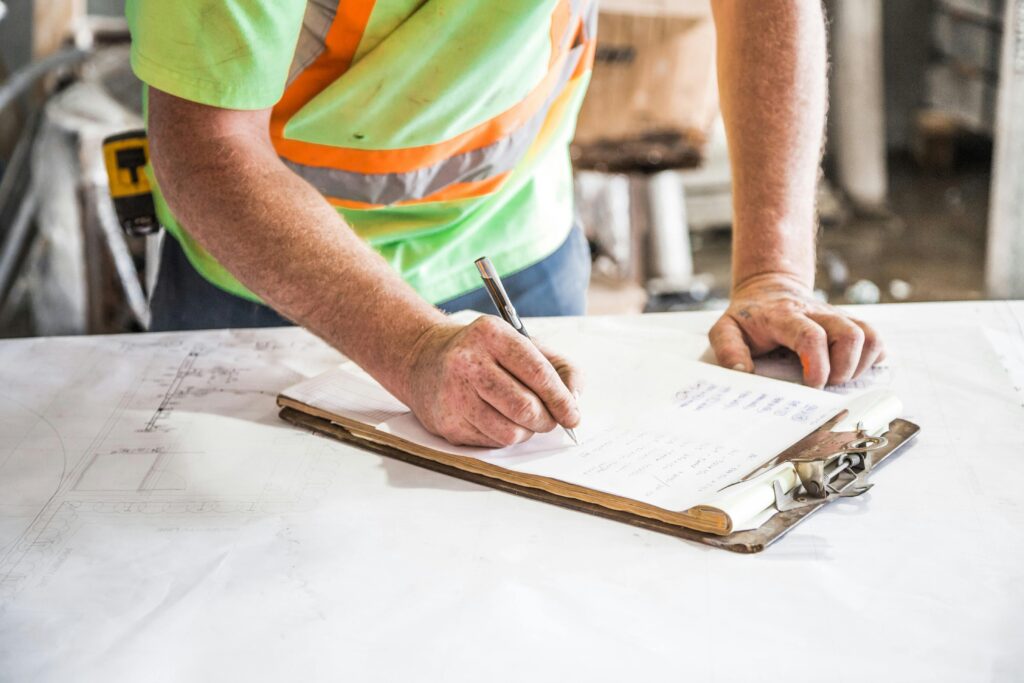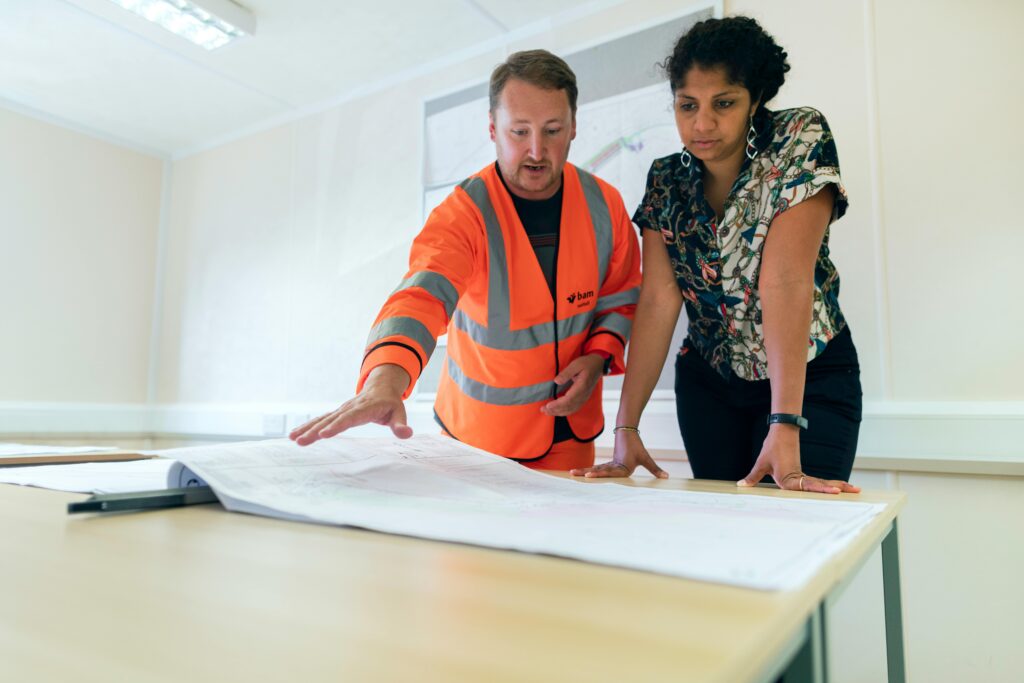
Hiring a Commercial Contractor in Tennessee
It’s a moment worth celebrating – when you’re finally ready to hire a commercial contractor in Tennessee for your business’s new renovation or build-out.
But not all commercial contractors in Tennessee are created equal, and the success of your project (or even your business) can hinge on this very important decision.
To help, we’ve outlined the most important things to consider when choosing a qualified commercial contractor.
Keep reading to understand the role of a commercial contractor, how to navigate the hiring process with ease, and the best questions to ask to ensure your selection is in alignment with your ultimate business goals.

What Does a Commercial Contractor Do?
A commercial contractor oversees the construction and renovation of commercial buildings, managing everything from materials to manpower.
They differ from general contractors mainly in the scale and type of projects handled.
When you first begin your search, it’s important to first answer this question: Are you already working with an architect who’s designing your new space?
If you aren’t working with an architect, that’s completely fine! But if you are expecting that the general contractor will handle all of that for you – you might be in for a surprise.
When you aren’t already working with a designer, you’ll need to find general contractors who do “design-build,” which means they’ll bring along an architect (whether that’s someone on their team, or a contractor that they hire out), to do the design work.
This step is crucial because stamped drawings from a licensed architect are necessary for obtaining a building permit (which you’ll need to make any renovations to a property).
Fortunately, many commercial contractors offer design-build services. Be sure to understand your specific needs before reaching out to contractors you are thinking about working with.

Step-by-Step Guide to Hiring a Commercial Contractor
Your project is too important to hire someone that you haven’t thoroughly vetted.
When running a business, time is money. Taking the time in the beginning to ensure your project will be done efficiently and accurately is key. And, in the long run, will save you time, money, and a lot of headaches.
Developing a Short List
First, develop your shortlist – a list of potential candidates.
While Google can be a good place to start, it’s important not to rely on it completely.
Why? Because at first, you’ll likely get a lot of results for residential contractors.
And, if you don’t already have a baseline familiarity with these companies, you’ll waste a fair bit of time trying to determine which do commercial vs residential work.
Even more, a lot of commercial contractors just don’t have many Google reviews, so if you’re looking for advice from a community, you likely aren’t going to find that online.
Talk with other business owners, consult your architect, or reach out to commercial real estate professionals for referrals. They are excellent resources in this process and can offer insight into a contractor’s reliability, quality of work, and business ethics.
The Bidding Process
There are two ways to approach the bidding process:
You can “bid” out the project first. This means that you start by getting 2-3 bids from different contractors. Then, you choose a contractor based on the price and scope of work you think aligns best with your budget and goals.
Or, you can evaluate some contractors first, then decide which one is most qualified and negotiate a price from there. This is called “sole source procurement.”
Either approach works. But no matter what you decide, be sure to choose your commercial contractor based on a combination of both price and qualifications.
Choosing a contractor solely because of a low bid could mean you are ending up with someone who isn’t committed to quality and safety.
It’s a good rule of thumb to get more than just 1 bid. This allows you to compare pricing.
It can also raise red flags if you notice that a bid is either much higher or much lower than the rest of the bids you receive.
Most bids should fall within a close range. If they don’t, it could mean that there was a miscommunication with the contractor, or that they missed something important.
It could also mean that a contractor is using second-rate materials or inexperienced labor to cut costs.
If you do decide to get more than 1 bid from contractors, make sure that each contractor quotes the same scope of work. Otherwise, there will be no way for you to know who is truly offering the best value.
In the end, several factors could impact the price that you will need to make decisions about.
For example, a company with a great reputation and experience can often charge more for its services because of the high level of skill they offer. You can also expect to pay higher costs if your project has a short time frame.
Ultimately, the decision is yours, and it will be up to you to make the final decision on what’s most important to you based on your project and business goals.

Know Your State Laws
It’s your job to interview your commercial contractor in Tennessee – even if the bid looks great or the contractor seems trustworthy. This process also gives you an idea of the company’s professionalism and their willingness to answer your questions.
Make sure the contractor you’re in conversation with has the proper credentials and insurance – it will save you elevated blood pressure in the long run.
In the state of Tennessee, for example, commercial contractors are regulated by the Tennessee Board for Licensing Contractors, which falls under the Department of Commerce and Insurance.
The state laws regarding commercial contractors are designed to ensure that individuals and businesses engaging in construction work are qualified, experienced, and adhere to safety and building standards.
This includes staying current with their licensing and securing the necessary insurance or surety bonds (when needed).
Check your local building department or consumer protection agency to find out about licensing requirements in your area. If your locality does have licensing laws, make sure the contractor’s license is current.
You can review the Tennessee licensing laws on the Department of Commerce and Insurance’s website.
They also have “tips for hiring a contractor” to help you identify other obligations your contractor is legally required to fulfill.
Ask for Proof and References
Don’t just ask if a contractor has insurance – ask for proof. Your contractor should be willing to give you the appropriate verification that they have appropriate licensing and insurance.
They also should be able to provide references. If they do, take time to contact them.
Ask how the contractor dealt with unexpected challenges, how they communicated, and how the project timeline and budget aligned with expectations.
If anything about their coverage or references feels off to you, it may be best to move on.

Observe Communication Styles
Communication is key for a project of any size.
Throughout the bidding and interviewing process, consider the communication and organization of the contractor.
If they are not getting back to you or if they seem disorganized, it may be an indicator of what your project will be like. But if your contractor is timely and communicative, this is a good sign of good organization and high-quality communication that will only make your project smoother.
You might also consider asking to meet with who will be working on your project. This will give you a feel for how you and these individuals will work together.
In most cases, you will be working on this project for several months, so it’s important that your working styles align.
If two contractors seem great, but you simply click better with one over the other – that’s a perfectly valid reason to go with that contractor.
Questions to Ask Your Potential Commercial Contractor
In summary, here is a list of things you and your contractor should discuss before signing any contract or beginning work on a project.
- Are you licensed?
Verify that the contractor is officially licensed to perform commercial construction work in your area.
- What types of projects do you do?
Determine their expertise and experience by asking about the types and sizes of projects they’ve previously completed.
- How soon can you start?
Inquire about their availability to ensure it aligns with your project timeline.
- What types of insurance do you carry?
Contractors should have: personal liability, worker’s compensation, and property damage coverage
- Will my project require a permit?
Discuss whether your project needs permits and how they will handle the permit process.
- When will you obtain permits for inspection?
Ensure they will obtain all necessary permits before starting work and display them as required.
- Will you be using subcontractors?
Ask if they plan to subcontract any work and, if so, verify that the subcontractors are also insured and licensed.
- What sets you apart?
Learn what makes them unique or better suited for your project compared to other contractors.
- What is your communication plan?
Determine how often and through what means they will update you on a project’s progress.
- How do you handle changes or modifications to the project scope?
Learn about their process for dealing with change orders or unexpected project adjustments.
- How do you ensure project safety and quality control?
Ask about safety protocols in place to protect workers and your property as well as their quality assurance processes and how they plan to meet or exceed industry standards.
- What warranty do you provide on your workmanship?
Inquire about any guarantees or warranties they offer for their work and materials used.
- How do you handle project payments and billing?
Discuss their billing schedule, payment terms, and any deposit required.
- Who will be the primary point of contact?
Identify who will be your main contact for questions and updates throughout the project.

Making the Final Decision When Hiring A Commercial Contractor in Tennessee
After conducting thorough research and interviews, it’s time to make your decision.
Consider factors such as the contractor’s track record, communication style, and the overall value they offer. Remember, the lowest bid may not always be the best choice if it compromises on quality or reliability.
Make it Official
Once you’re ready to move forward, don’t forget the most important step: making it official.
It’s extremely important to have a contract that puts everything you and the contractor have discussed into writing. Your contractor should never begin work without this contract in place – for your protection and theirs.
This contract should include:
- The scope of work
- The schedule
- The contract amount
- Payment terms
Read the contract carefully. Take your time and don’t allow anyone to rush you into a decision.
If a contractor (or sales agent) tries to make you sign something on the spot, or if they will not leave a copy for you to review, you should be suspicious.
Don’t hesitate to seek legal advice to ensure your interests are fully protected.
Payment Do’s and Don’ts
Once you sign a contract, it will likely be time to pay a deposit.
Never pay cash and do not pay the total amount before the work is complete or turn over your insurance check!
Check your local laws regarding payment regulations. In Tennessee, the law prohibits requiring more than ⅓ down payment.

Next Steps in Hiring a Commercial Contractor in Tennessee
By following this detailed guide, you’ll be well-equipped to make an informed choice that aligns with your business goals, budget, and timeline.
Remember, the effort you put into selecting a contractor will pay dividends in the quality, efficiency, and success of your project!
InterVision Building Group prides itself on offering comprehensive design-build contracting services and the highest level of communication and service. We’d love the opportunity to discuss partnering with you on your next commercial construction project.
Reach out here to see if InterVision could be the right fit for you and your commercial project.
Leave a Reply Cancel reply
We pledge to navigate every phase of your project with meticulous care and transparency.
WHAT YOU CAN EXPECT
learn more
We are a General Contractor partnering with professionals and organizations to bring commercial building visions to life.
Who we are
Serving the Greater Memphis, TN Metropolitan area and beyond.
Serving the Greater Memphis, TN Metropolitan area and beyond.